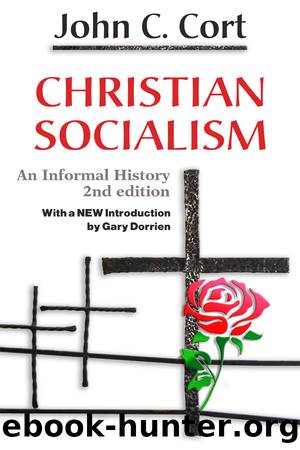Christian Socialism: An Informal History, With an New Introduction by Gary Dorrien by John C. Cort

Author:John C. Cort [Cort, John C.]
Language: eng
Format: mobi
Publisher: Orbis Books
Published: 2020-05-19T16:00:00+00:00
an aristocrat, Wilhelm Emmanuel von Ketteler.
Ketteler's Precursor
Before exploring the career of Wilhelm Emmanuel von Ketteler, archbishop of Mainz, we should acknowledge the contribution of his John the Baptist, the layman Franz von Baader, who was ennobled in 1820 for his work as a mining engineer in the Bavarian government.
Franz von Baader (1765–1841) has been described by one historian as “the first to create the concept of ‘Christian socialism’ [and] the true initiator of Catholic sociology and social doctrine in Germany.” 16 Born in Munich the son of a Bavarian court physician, Baader suffered a precocious period of depression between the ages of seven and ten, from which he was suddenly freed while looking at some geometrical figures. He became a doctor, but the sight of his patients’ sufferings was too painful for him and he took up the study of mining. In this field he spent several years in Scotland and England, where he was deeply moved by the suffering of the industrial proletariat. In fact, he was one of the first, if not the first, to focus attention on the proletariat, the “property-less wage earners,” as he called them in his 1835 study On the Present Faulty Relationship Between the Property-less, or Proletarians, and the Propertied Classes of Society .
Baader read widely—Locke, Hume, Hobbes, Kant, Augustine, Aquinas, Meister Eckhart, Fichte, Hegel. He was a personal friend and admirer of Lamennais, particularly in the latter's middle period, after the conservative phase and before Gregory XVI drove him into apostasy. He was fascinated by the seventeenth-century mystic Jakob Böhme, though he was at first so outraged by the theosophical obscurities he was reading that he flung the book against the wall. Finally he taught at the University of Munich under the all-purpose title Professor of the Philosophy of Nature, Civil, and Religious Society.
This dazzling variety of social, economic, scientific, philosophical, and religious study and experience Baader condensed, or expanded, into sixteen volumes of diverse writings that lay buried and unknown for many years, surfacing briefly in the 1860s when Ketteler was doing his serious work on the social question, returning to obscurity, and then surfacing again after World War I when they were rediscovered by Kierkegaard, the Great Dane, who singled Baader out as his own precursor and wrote that he “should be known as a matter of course to all those who wish to ponder these matters,” that is, the existential problems of evil and liberty. 17
Consider a few samples of Baader's thought, which combine an understanding of patristic and scholastic notions of property with a somewhat romantic evocation of medieval institutions and modern and progressive calls for a new application of those notions and institutions in the total separation of church and state, popular sovereignty, and worker associations.
On property:
Christianity has also fundamentally reformed all doctrines and notions of acquisition, possession and consumption of property by doing away with the pagan concept of absolute property without, however, barring individual acquisition and possession. But every use and consumption of property that is not social is anti-social.
Download
This site does not store any files on its server. We only index and link to content provided by other sites. Please contact the content providers to delete copyright contents if any and email us, we'll remove relevant links or contents immediately.
Joan of Arc by Mary Gordon(3756)
Victory over the Darkness by Neil T. Anderson(2708)
The Gnostic Gospels by Pagels Elaine(2372)
Devil, The by Almond Philip C(2180)
The Nativity by Geza Vermes(2097)
The Psychedelic Gospels: The Secret History of Hallucinogens in Christianity by Jerry B. Brown(2059)
Going Clear: Scientology, Hollywood, and the Prison of Belief by Lawrence Wright(1859)
Going Clear by Lawrence Wright(1842)
A TIME TO KEEP SILENCE by Patrick Leigh Fermor(1745)
Barking to the Choir by Gregory Boyle(1712)
Old Testament History by John H. Sailhamer(1700)
Augustine: Conversions to Confessions by Robin Lane Fox(1671)
A History of the Franks by Gregory of Tours(1618)
The Bible Doesn't Say That by Dr. Joel M. Hoffman(1594)
The Knights Templar by Sean Martin(1586)
A Prophet with Honor by William C. Martin(1580)
by Christianity & Islam(1550)
The Amish by Steven M. Nolt(1476)
The Source by James A. Michener(1428)
